- Home
- Philip Roth
The Anatomy Lesson Page 8
The Anatomy Lesson Read online
Page 8
“Well, a lot of people who aren’t twenty and don’t have ultra-privileged Christian-Connecticut backgrounds wouldn’t understand either, not if they saw you looking like this. ‘Why those Jews in Higher Education, all too authentic to you in 1959, are suddenly the excreta of a vulgar imagination is because the sole Jewish aggression sanctioned in 1973 is against Egypt, Syria, and the PLO.’ Nathan, you can’t believe the PLO is why he wrote that piece.”
“But it is. If it wasn’t for Yasir Arafat he’d never be on my ass. You don’t know what frazzled Jewish nerves are like.”
“I’m learning. Please, take a Percodan. Smoke some pot. Have a vodka. But calm down.”
“You get over to that desk and type. I pay you to type for me.
“Well, not that much. Not enough for this.” Again she read aloud from his letter. ‘“In your view, it really isn’t deranged Islam or debilitated Christianity that’s going to deal us the death blow anyway, but Jewish shits who write books like mine, carrying the hereditary curse of self-hate. And all to make a dollar. Six million dead—six million sold. Isn’t that the way you really see it?’ Nathan, this is all ludicrous and overstated. You’re a man of forty and you’re flailing out like a schoolboy who’s been made to stand in the comer.”
“Go home. I greatly admire your self-possession in telling me off like this, but I want you to go away.”
“I’ll stay till you calm down.”
“I’m not calming down. I’ve been calm long enough. Go,”
“Do you really think it’s intelligent to be so unforgiving about this great wrong that’s been committed against you? This enormous wrong?”
“Oh, should I forgive him?”
“Yes. You see, I am a Christian. I do believe in Christ. And in people like Gandhi. And you’re going back to that dreadful Old Testament. That stonelike book. Eye for eye and teeth for teeth and never forgive anybody. Yes, I’m saying that I believe in forgiving my enemies. I can’t believe in the end that it isn’t healthier for everybody.”
“Please don’t prescribe peace and love, Don’t make me a member of your generation.”
“Gandhi wasn’t a member of my generation. Jesus isn’t a member of my generation. St. Francis of Assisi wasn’t a member of my generation. As you God damn well know, I’m not even a member of my generation.”
“But I’m not Jesus, Gandhi, St. Francis, or you. I’m a petty, raging, vengeful, unforgiving Jew, and I have been insulted one time too many by another petty, raging, vengeful, unforgiving Jew, and if you intend to stay, then type what I’ve written, because it cost me bloody hell in my aching joints to write it.”
“Okay. If you’re such a Jew, and these Jews are all so central to your thinking—and that they have this hold is unfathomable to me, really—but if you really are stuck on Jews like this, and if Israel does mean something to you, then sure I’ll type—but only if you dictate an essay about Israel for The New York Times.”
“You don’t understand. That request from him, after what he’s published in inquiry, is the final insult. In Inquiry, run by the kind of people he used to attack before he began attacking people like me!”
“Only it is not an insult. He’s asked you what he’s asked because people know who you are, because you can be so easily identified with American Jews. What I can’t understand is what you’re in such a state about. Either do it or don’t do it, but don’t take it as an insult when it wasn’t meant as one.”
“What was it meant as? He wants me to write an article that says I’m not an anti-Semite anymore and that I love Israel with all my heart—and that he can stick up his ass.”
“I can’t believe that’s what he wants you to write.”
“Diana, when somebody who has said about me and my work and the Jews what this guy has, then turns around and says why don’t you write something nice about us for a change—well. how can you fail to understand that this is particularly galling to me? “Write something in behalf of Israel.’ But what about the hostility to Jews that’s at the heart of every word I publish? To propagate that caricature in Inquiry, publicly to damn me as the caricaturist, and then in private to suggest this piece—and with some expectation at least of the crypto anti-Semite’s acquiescence! ‘He has prestige with segments of the public that don’t care for the rest of us.’ Right—the scum, the scum whom his novels are fashioned to please. If Zuckerman, a Jew adored by the scum for finding Jews no less embarrassing and distasteful than they do, were to make the argument for the Jews to the scum, ‘it would be of some interest.’ You bet! Like a case of schizophrenia is of interest! On the other hand, when Appel speaks up in a Jewish crisis, ‘it’s expected.’ Sign of deep human engagement and predictably superior compassion. Sign of nothing less than the good, the best, the most responsible Jewish son of them all. These Jews, these Jews and their responsible sons! First he says I vilify Jews under the guise of fiction, now he wants me to lobby for them in The New York Times’. The comedy is that the real visceral haters of the bourgeois Jews, with the real contempt for their everyday lives, are these complex intellectual giants. They loathe them, and don’t particularly care for the smell of the Jewish proletariat either. All of them full of sympathy suddenly for the ghetto world of their traditional fathers now that the traditional fathers are Filed for safekeeping in Beth Moses Memorial Park. When they were alive they wanted to strangle the immigrant bastards to death because they dared to think they could actually be of consequence without ever having read Proust past Swann’s Way. And the ghetto—what the ghetto saw of these guys was their heels: out, out, screaming for air, to write about great Jews like Ralph Waldo Emerson and William Dean Howells. But now that the Weathermen are around, and me and my friends Jerry Rubin and Herbert Marcuse and H. Rap Brown, it’s where oh where’s the inspired orderliness of those good old Hebrew school days? Where’s the linoleum? Where’s Aunt Rose? Where is all the wonderful inflexible patriarchal authority into which they wanted to stick a knife? Look, I obviously don’t want to see Jews destroyed. That wouldn’t make too much sense. But I am not an authority on Israel. I’m an authority on Newark. Not even on Newark. On the Weequahic section of Newark. If the truth be known, not even on the whole of the Weequahic section. I don’t even go below Bergen Street.”
“But it’s not a matter of whether you’re an authority. It’s a matter of people reading what you say because at the moment you’re very famous.”
“So is Sammy Davis. So is Elizabeth Taylor. They’re even more famous. And they’re real Jews who haven’t ruined their credentials writing vulgar books. They haven’t set loose the illicit forces that are now corrupting the culture. Why doesn’t he ask them, if he wants somebody famous? They’d jump at the chance. Besides, that I’m famous for what I’m famous for is precisely what makes me reprehensible to Appel. That’s what he’s scolding me about. He actually seems to have read that book as a manifesto for the instinctual life. As if he’d never heard of obsession. Or repression. Or repressed obsessive Jews. As if he isn’t one himself, the fucking regressive nut! Diana, I have nothing to say, at Appel’s request, about Israel. I can write an essay about a novelist, and even that takes six months, but I can’t write an essay about international politics, not for anyone. I don’t do it, I never have. I am not Joan Baez. I am not a great thinker like Leonard Bernstein. I am not a political figure—he flatters me to suggest that I am.”
“But you’re a Jewish figure. Whether you want to be or not. And as you seem to want to be, you might as well do it. Why are you making it so difficult? Just state your opinion. It’s as simple as that. Where you stand.”
“I will not make atonement on the Op Ed page for the books he’s accused me of writing! I cracked a few jokes about playing stinky-pinky in Newark and you’d think I’d blown up the Knesset. Don’t start confusing me with your Wasp clarity—’there is no problem.’ There is! This is not my maiden appearance in the pages of Foreskin as their Self-Hating Jew of the Month.”
“Bu
t that is a petty little ghetto quarrel of no interest to anyone. How many Jews can dance on the head of a pin? No one cares. You can’t really remember what some silly magazine has said about you—your mind would just be muck. If the magazine is as awful as you say, why should you even bother to worry? Besides, the one subject is so big and the other is so tiny, and the two have come together for you in a very strange way that I cannot understand, no matter how many ways you explain it. To me it seems like you’re balancing a very large mountain against a very tiny molehill, and, truthfully, if anybody had told me you were like this before I met you… or that Jews were like this. I just thought they were immigrants—period. No, I don’t understand. Maybe I’m only twenty, but you’re forty years old. Is this really what happens when people hit forty?”
“You bet. They’ve had it up to fucking here. This is exactly what happens. Twenty years into your livelihood, and whether you know how to do it, whether you should be doing it at all, still a matter of public debate! And still in doubt yourself. How do I even know that Appel isn’t right? What if my writing’s as bad as he says? I hate his guts, and obviously the sixties have driven him batty, but that doesn’t make him a fool, you know. He’s one of the few of them around who make any sense at all. Let’s face it. even the worst criticism contains some truth. They always see something you’re trying to hide.”
“But he exaggerates it. It’s all out of proportion. He doesn’t see the good things. He won’t even acknowledge that you’re funny. That’s ridiculous. He only sees crudely what you fail at. Well, everybody has failings.”
“But suppose he’s right. Suppose nobody needs my books. Suppose I don’t even need them. Am I funny? And if I am, so what? So are the Ritz Brothers. Probably funnier. Suppose what he implies is true and I’ve poisoned their sense of the Jewish reality with my vulgar imagination. Suppose it’s even half true. What if twenty years of writing has just been so much helplessness before a compulsion—submission to a lowly, inconsequential compulsion that I’ve dignified with all my principles, a compulsion probably not all that different from what made my mother clean the house for five hours every day. Where am I then? Look, I’m going to medical school.”
“Pardon?”
“Medical school. I’m pretty sure I’ve got the grades. I want to be a doctor. I’m going back to the University of Chicago.”
“Oh, shut up. So far, this conversation has just been depressing. Now it’s idiotic.”
“No, I’ve been thinking about this for a long lime. I want to be an obstetrician.”
“At your age? Really? In ten years you’ll be fifty. Pardon me, but that’s an old man.”
“And in sixty years I’ll be a hundred. But I’ll worry about that then. Why don’t you come with me? You can transfer your credits from Finch. We’ll do our homework together.”
“Do you want to write the piece about Israel or not?”
“No. I want to forget Israel. I want to forget Jews. I should have the day i left home. Take your penis out in public and of course the squad car comes around—but, really, this has gone on now a little too long. The way I found to spring myself from everything that held me captive as a boy, and it’s simply extended the imprisonment to my fortieth year. Enough of my writing, enough of their scolding. Rebellion, obedience—discipline, explosion—injunction, resistance—accusation, dental—defiance. shame—no, the whole God damn thing has been a colossal mistake. This is not the position in life that I had hoped to fill. I want to be an obstetrician. Who quarrels with an obstetrician? Even the obstetrician who delivered Bugsy Siegel goes to bed at night with a clear conscience. He catches what comes out and everybody loves him. When the baby appears they don’t start shouting, “You call that a baby? That’s not a baby!” No, whatever he hands them, they take it home. They’re grateful for his just having been there. Imagine those butter-covered babies, Diana, with their little Chinese eyes, imagine what seeing that does to the spirit, that every morning, as opposed to grinding out another two dubious pages. Conception? Gestation? Gruesome laborious labor? The mother’s business. You just wash your hands and hold out the net. Twenty years up here in the literary spheres is enough—now for the fun of the flowing gutter. The bilge, the ooze, the gooey drip. The stuff. No words, just stuff. Everything the word’s in place of. The lowest of genres—life itself. Damn right I’ll be fifty next time I look. No more words! On to the delivery room before it’s too late. Headlong into the Cloaca Maxima and all the effusions thereof. Leave Finch and fly out to Chicago with me. You can go to school at my alma mater.”
“Leave Finch and I lose my trust fund. You don’t want me anyway. You want a nursemaid. You want a governess.”
“Would it make any difference if I said I’d marry you?”
“Don’t fuck with me.”
“But would it?”
“Yes, it would, of course it would. Do it. Do it now. Let’s get married tonight. Then we’ll run away from your life and you’ll become a doctor and I’ll become a doctor’s wife. I’ll take the phone calls. I’ll make the appointments. I’ll boil your instruments. The hell with my trust fund. Let’s do it now. Let’s go out tonight and get the license and the blood tests.”
“My neck hurts too much tonight.”
“That’s what I figured. You’re full of shit, Nathan. There’s only one thing for you to do and that’s to get on with it. WRITE ANOTHER BOOK. Carnovsky is not the end of the world. You cannot make yourself a life of misery out of a book that just happened to have been a roaring success. It cannot stop you in your tracks like this. Get up off the floor, get your hair back, straighten out your neck, and write a book that isn’t about these Jews. And then the Jews won’t bug you. Oh, what a pity you can’t shake free. That you should still be aroused and hurt by this! Are you always fighting your father? I know it may sound like a cliché, probably it would be with somebody else, but in your case I happen to think that it’s true. I look through these books on your shelves, your Freud, your Erikson, your Bettelheim, your Reich, and every single line about a father is underlined. Yet when you describe your father to me, he doesn’t sound like a creature of any stature at all. He may have been Newark’s greatest chiropodist, but he sure doesn’t sound like much of a challenge otherwise. That a man of your breadth of intelligence and your total freedom in the world … that this should beat you down. That you should be so broken down from these Jews. You hate this critic Appel? You don’t ever want to stop hating him? He’s done you such a grievous injury? Okay, the hell with this crazy little four-page letter—go bonk him on the nose. Are Jews scared of physical confrontations? My father would go and punch him in the nose if he thought he’d been insulted the way you do. But you aren’t man enough to do that, and you aren’t man enough just to forget it—you aren’t even man enough to write for the Op Ed page of The New York Times. Instead you lie there in your prism glasses and make up fairy tales about medical school, and having a doctor’s office with a picture on the desk of a doctor’s wife, and coming home FROM work and going out TO RELAX, and when someone on a plane faints and a stewardess asks if anybody here is a doctor, you can stand up and say I am.”
“Why the hell not? They never come around when someone faints and ask if anybody here is a writer.”
“More of your black-and-blue humor. Go back to school again, to study, to be the professor’s pet and make the Dean’s List and get an ID card for the library and all the student activities. At forty. You know why I wouldn’t marry you? I would say no anyway, because I couldn’t marry anybody so weak.”
> 3 <
THE WARD
ONE morning only a few days later, one very depressing morning in December 1973, after he’d been up much of the night vainly trying to compose into his tape recorder a more reasonable reply to Milton Appel, Zuckerman came down to the mailbox in his orthopedic collar to see why the postman had rung. He wished he’d brought a coat along: he was thinking of continuing out into the cold and on to the corner to jump from t
he roof of the Stanhope Hotel. He no longer seemed worth preserving. From Ito 4 a.m., with the noose of a narrow electric heating pad encircling his cervical spine, he’d gone another fifteen rounds with Appel. And now the new day: what equally useful function could he perform through the interminable hours awake? Cunnilingus was about it. Step right up, sit right down. It was all he was good for. Blotted out everything else. That and hating Appel. Smothered with mothers and shouting at Jews. Yes, illness had done it: Zuckerman had become Carnovsky. The journalists had known it all along.
The problem with jumping is smashing your skull. That can’t be pleasant. And if he wound up merely severing his spinal cord on the hotel canopy—well, he’d be bedridden for life, a fate hundreds of thousands of times worse than what already was making him miserable. On the other hand, a failed suicide that didn’t completely cripple him might provide a new subject—more than could be said so far for success. But what if the pain vanished halfway down, went the way it came, leaped from his body as he sailed from the roof—what then? What if he saw in every salient detail a next book, a new start? Halfway down is probably just where that happens. Suppose he walked to the Stanhope simply as an experiment. Either the pain disappears before I reach the corner or I enter the hotel and wait for the elevator. Either it disappears before I get into the elevator or I go up to the top floor and out through the fire exit onto the roof. I walk straight to the parapet and look sixteen floors down to the traffic, and this pain comes to realize that I’m not kidding, that sixteen floors is a very respectable distance, that after a year and a half it is time to leave me alone. I lean out toward the street and I say to the pain—and i mean what I say—”One minute more and I jump!” I’ll scare it out of me.
But all he scared with such thoughts was himself.
Two manila envelopes in the mailbox, so tightly wedged together that he skinned his knuckles in the excitement of prying them out. The medical-school catalogue, his application forms! What he hadn’t dared to tell Diana was that already, weeks before, he’d sent off his inquiry to the University of Chicago. From his seat in the doctors’ waiting rooms, watching the patients come and go, he’d begun to think: Why not? Four decades, four novels, two dead parents, and a brother I’ll never speak to again—looks from the evidence like my exorcism’s done. Why not this as a second life? They talk in earnest to fifty needy people every day. From morning to night, bombarded by stories, and none of their own devising. Stories intending to lead to a definite, useful, authoritative conclusion. Stories with a clear and practical purpose: Cure me. They follow carefully all the details, then they go to work. And either the job is doable or undoable, while mine is both at best and mostly not.

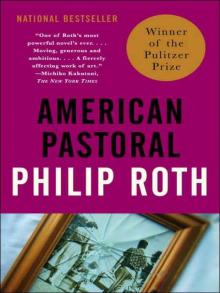 American Pastoral
American Pastoral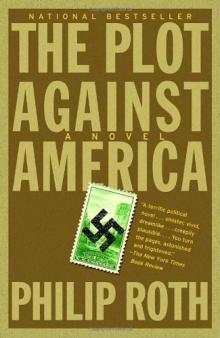 The plot against America
The plot against America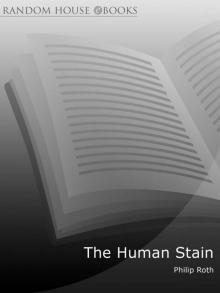 The Human Stain
The Human Stain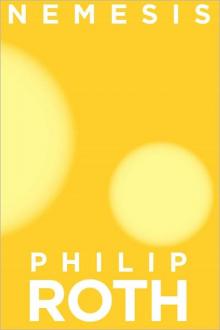 Nemesis n-4
Nemesis n-4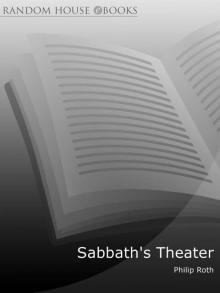 Sabbath’s Theater
Sabbath’s Theater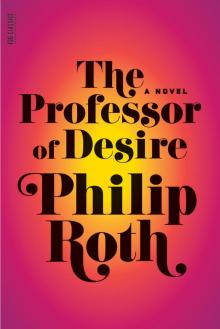 The Professor of Desire
The Professor of Desire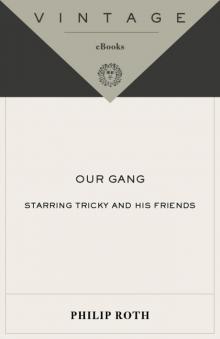 Our Gang
Our Gang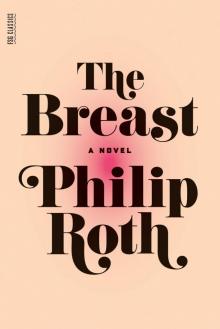 The Breast
The Breast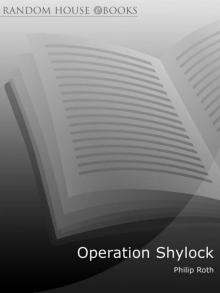 Operation Shylock
Operation Shylock The Dying Animal
The Dying Animal Letting Go
Letting Go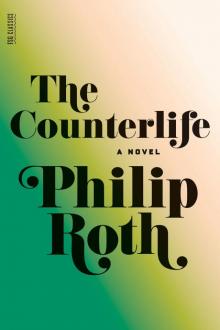 The Counterlife
The Counterlife Everyman
Everyman Nemesis
Nemesis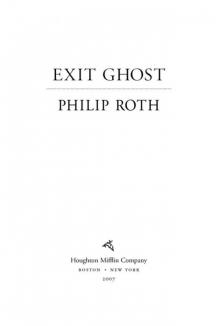 Exit Ghost
Exit Ghost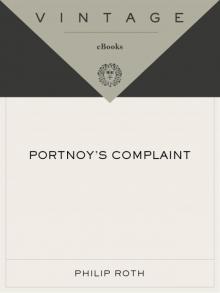 Portnoy's Complaint
Portnoy's Complaint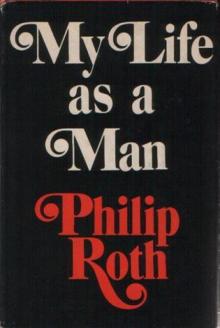 My Life as a Man
My Life as a Man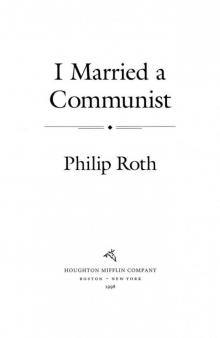 I Married a Communist
I Married a Communist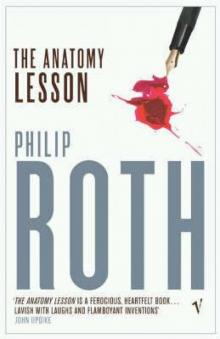 The Anatomy Lesson
The Anatomy Lesson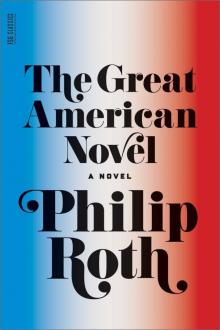 The Great American Novel
The Great American Novel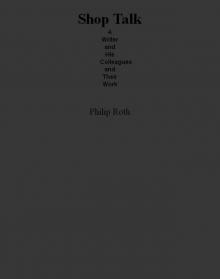 Shop Talk
Shop Talk The Humbling
The Humbling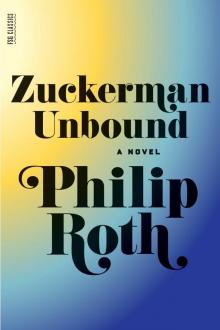 Zuckerman Unbound
Zuckerman Unbound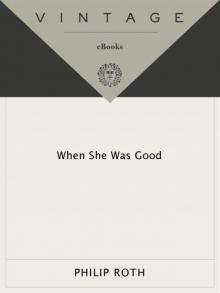 When She Was Good
When She Was Good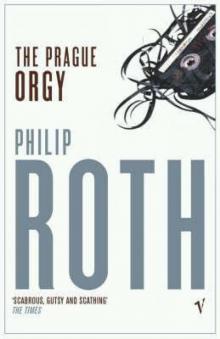 The Prague Orgy
The Prague Orgy American Pastoral (Nathan Zuckerman)
American Pastoral (Nathan Zuckerman) Goodbye, Columbus
Goodbye, Columbus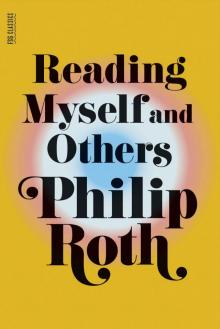 Reading Myself and Others
Reading Myself and Others